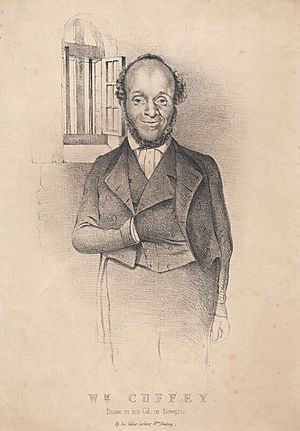William Cuffay facts for kids
William Cuffay (1788 – July 1870) was an important leader in the Chartist movement in London during the early Victorian period. He fought for the rights of working people to have a say in how their country was run.
Quick facts for kids
William Cuffay
|
|
|---|---|
 |
|
| Born | 1788 Medway Towns, Kent, England
|
| Died | July 1870 (aged 81–82) |
| Nationality | British |
Contents
Early Life of William Cuffay
William Cuffay was born in 1788 in Old Brompton, which is part of the Medway Towns in Kent, England. His mother, Juliana Fox, was English, and his father, Chatham Cuffay, was of African heritage from Saint Kitts. Chatham had been enslaved before.
William became a tailor and worked in Chatham. He was quite short, about 1.5 meters (4 feet 11 inches) tall. Around 1819, he moved to London. He had a daughter named Ann Juliana Cuffay.
William Cuffay and the Chartists
William Cuffay was a strong supporter of workers' rights. In 1834, he joined other tailors in a strike. They wanted shorter workdays and better pay. After the strike ended, William lost his job and found it hard to get new work because he was "blacklisted." This meant employers would not hire him.
In 1839, William helped start the Metropolitan Tailors' Charter Association. He became a leader in the Chartist movement, first joining the Chartist Metropolitan Delegate Council in 1841 and then the National Executive in 1842.
The Chartists were a group of working-class people who wanted more democracy in Britain. They created the "People's Charter," which asked for things like the right for all men to vote.
William Cuffay helped organize a big Chartist gathering at Kennington Common on April 10, 1848. He believed in showing strength to make their demands heard.
Arrest and Life in Tasmania
Because of his strong beliefs and actions, William Cuffay was arrested. He was accused of planning to start an uprising against Queen Victoria. He was found guilty and sentenced to 21 years of penal transportation. This meant he was sent far away to Tasmania, an island that was then a British colony.
William spent the rest of his life in Tasmania. Even though he was pardoned (forgiven) three years later, he chose to stay there. He continued working as a tailor and remained active in local politics, fighting for democratic rights.
William Cuffay died in July 1870 at the age of 82. Even though he died without much money, several newspapers in Australia wrote about him. They noted that his grave was "marked," suggesting a memorial might be built one day. However, no memorial was built at that time, and William Cuffay was largely forgotten in both Australia and Britain for a while. Recently, people have become interested in his story again, and there are plans to create a memorial or statue for him.
William Cuffay in Media
William Cuffay's story has been shared in different ways:
- In 2010, BBC Radio 4 aired a program called Britain's Black Revolutionary, presented by Bill Morris.
- In 2011, the ABC made a radio documentary called Isle of Denial: William Cuffay in Van Diemen's Land.
- He also appeared in the third season of the UK TV show Victoria.
In 2013, an exhibition in the UK Houses of Parliament celebrated 175 years since the People's Charter was published. It showed a special book of poetry by Byron that London Chartists had given to William Cuffay when he was sent to Tasmania. This gift showed their great respect for his dedication to his country.
On July 15, 2021, a blue plaque was put up at Chatham Historic Dockyard to remember both William Cuffay and his father, Chatham Cuffay.
William Cuffay was also played by Jade McCrea in a docu-drama called 'William Cuffay: The London Chartist Leader'. This was shown during Black History Month in 2022.
See also
- List of convicts transported to Australia
 | Dorothy Vaughan |
 | Charles Henry Turner |
 | Hildrus Poindexter |
 | Henry Cecil McBay |

